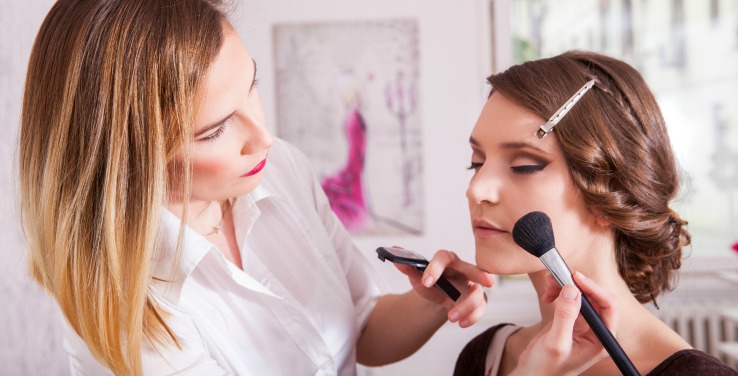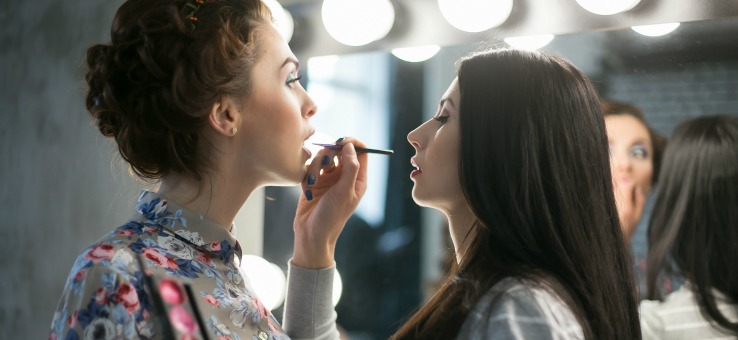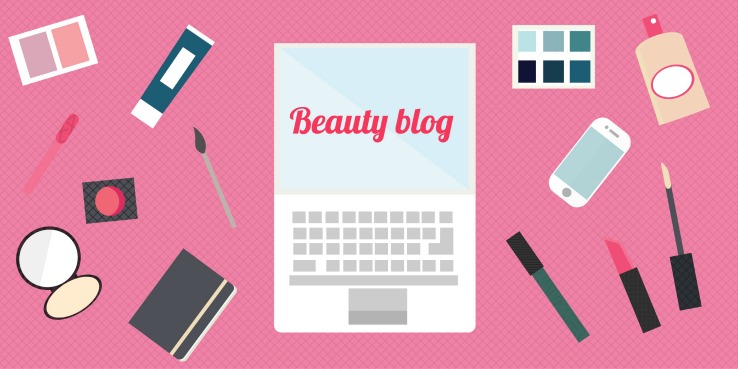It’s official- you’re a certified makeup artist! You’ve learned your techniques, you’ve practiced with your tools, and you’re ready to start your professional career! Now what? Many beginner makeup artists feel apprehensive about how to spark their career once they’re finished training. How can you start building a client base? What steps should you take in your first year?
Turning your training into practical work experience doesn’t happen overnight. Here are 7 steps you can take to get the ball rolling!
1. Start networking
Interacting with other makeup artists, or even just makeup enthusiasts, will do wonders for getting your name out there.
- The professionals who trained you might connect you with job opportunities.
- Fellow makeup artists might know of clients they can’t take but that they’d be willing to refer you to.
Network online in forums and on social networks, interact with other makeup artists at conventions, or seek out other professionals who might want to partner with a makeup artist, like photographers, models, and hair stylists. Staying active in your local community is a smart tactic when it comes to being competitive in the industry, particularly for new artists who need to build a client base.

2. Consider retail work
Some qualified makeup artists look at cosmetic retail jobs as being at step down from other contracts. Many artists prefer to concentrate on freelance makeup artistry. In reality, the two jobs can support each other very well.
Especially during your first year in the industry, working a retail makeup job is both an educational and a networking opportunity. You’ll become familiar with more products, do makeup applications for different face shapes and skin types, and maybe even receive free additional training as part of your work.
If you decide to move on to freelance work or apply for jobs with productions companies and talent agencies, retail work will look great on your resume.

3. Become an assistant
Shadowing a more experienced makeup artist is an amazing opportunity to refine your skills and learn through hands-on work. That artist’s clients might even refer you to others if they admire your work. Shadowing someone with more experience lets you see what successful makeup artists do right and how they handle it when things go wrong. Assistantships are a great transition between your training and your professional career. They’ll prepare you for making your own way in the industry.

4. Volunteer
Just because you’re a beginner doesn’t mean you should give your services away for free. Doing too much work for no pay devalues your skills. Potential clients might think that you work for free because you’re not very good.
In your first year, however, doing volunteer work can be beneficial. Volunteering is an opportunity to stay in practice while you network. Contact local retirement homes, theater groups, schools plays, or dance recitals. Doing free makeup for groups like these lets you help people, keep your skills in practice, get your name out there, and prove to your local community that your work is worth paying for in the future.

5. Keep looking for work
During their first year in the industry, many makeup artists struggle with inconsistency between contracts and jobs. Don’t let this discourage you from taking temporary contracts or applying for makeup jobs.

Not hearing back from potential employers is no reason to stop distributing your portfolio and resume. Think about it this way: the more resumes you submit, the more potential clients or employers will be introduced to your name. In the time it takes for one of them to call you, submit more applications, work small contracts, take volunteer opportunities, or shadow more experienced professionals.
The things you do between big contracts keep you in practice, teach you new things, and build your resume. It also looks more impressive to potential clients and employers if you’re active between jobs, rather than disappearing from the industry.
6. Build your brand
One of the smartest things a beginner makeup artist can do in their first year is build their brand and establish a solid presence online and in their local industry.
When you’re not volunteering or assisting, work on building a quality website, starting a blog, and creating a professional portfolio. The stronger your branding platforms are, the more easily potential clients and employers can see the quality of your work, making them far more likely to hire you.

7. Offer lessons, workshops, or parties
If you find that you have space between work opportunities, do something about it! Try not to sit back and wait until something falls into your lap. Makeup artistry is one of the few industries where professionals can create work for themselves.
Between jobs, tell your friends and past clients that you’re available for makeup lessons, makeover parties, and group workshops, etc. Even one-time jobs like these support your resume, and they also show potential clients and employers that you’re pro-active about your career.

Keep it up!
Your first year working as a professional makeup artist might be a challenge, but there are ways to help yourself. Don’t let feelings of uncertainty stop you from taking steps towards an active career and a solid client base. New makeup artists who show initiative and drive during their first year in the industry will spark a successful career for themselves.
